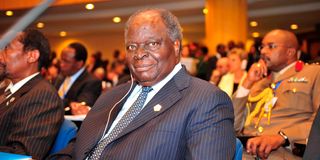End of Kibaki's free education

Former President the late Mwai Kibaki.
Exactly 22 years after former President Mwai Kibaki announced that learners in public primary schools would no longer pay fees, all signs point to parents being forced to foot the bill soon due to a funding crisis in the sector.
This emerged yesterday when Education Cabinet Secretary Julius Migos told legislators that the country is facing a serious cash crunch, as it emerged that the government owes public schools at least Sh64 billion in undisbursed capitation funds for the last nine years.
Kibaki's legacy undermined
CS Ogamba spoke before the Education Committee of the National Assembly amid revelations that school heads have been imposing illegal levies on parents and guardians to fill the gap created by undisbursed capitation monies.
“We need to discuss how we can fund the education sector in the country. Persistent underfunding affects the quality of education. It is a live problem,” said CS Migos.
The CS nonetheless noted that the government gives the resources it can afford and that in the current circumstances, “we are underfunded.”
“We are between a rock and a hard place,” said Mr Migos as he blamed the MPs for their failure to allocate the required resources to ensure education is well financed.
“We ask for a budget, but it is reduced. We are grappling with the question of what to do about it. We don’t get what we ask for. We continue to accumulate pending bills in capitation fees as the number of students increases,” the CS said.
The Constitution gives the National Assembly the power of the purse.
This means that every financial year, the MPs allocate funds to various government departments, constitutional offices and independent offices to enable them to undertake their operations. Documents CS Migos provided to the committee show that every learner in primary school is entitled to receive Sh1,420 per year in capitation funding from the government.
The funds are disbursed to schools at the beginning of every term. For term 1 of 2025, the Ministry of Education disbursed Sh4.13 billion for 5,812,164 learners.
“There is no money owed to schools for term 1. All the money was disbursed in January 2025,” said CS Migos.
The approved rate of capitation for Junior Schools, the CS says, is Sh15,043 per learner per year and in term 1 of 2025, Sh15.32 billion was disbursed for the 2,994,201 learners in the 20,350 junior schools across the country.
The amount, according to the CS, is 50 percent of the annual capitation due to the schools and the entire amount was disbursed in January 2025.
At the secondary school level, the approved capitation rate is Sh22,244 per learner per year, which is Sh36.4 billion for the current financial year- 2024/25.
CS Migos revealed that for term 1 of 2025, the ministry disbursed Sh28.8 million for the 3,268,616 learners across the 9,513 schools with each learner receiving Sh8,818.
The CS notes that the disbursement was 50 percent of the budgeted amount and was done in two tranches of Sh14.41 billion disbursed in January 2025, with the second tranche sent in March 2025.
MPs demand answers
However, Igembe North MP Julius Taitamu and Narok County Woman Representative Rebecca Tonkei were not convinced by CS Migos’ response, given the situation parents and guardians are forced through.
Mr Taitamu demanded that the CS tell the country the truth about the education funding in public schools.
“You are lying! Just tell the country that it is the parents running the schools,” said Mr Taitamu, with Ms Tonkei also weighing in.
“How free is education in the country? How do school heads plan without capitation funds? How do they run the schools in such circumstances?” posed Ms Tonkei.
The Education Committee chairperson Julius Melly (Tinderet), demanded that the CS explain why parents are being “fleeced.”
“Parents are asked to pay for examination fees in schools. Why are you allowing parents to be fleeced?” posed Mr Melly.
He continued, “Are we able to provide free education? We need a national conference on this.”
A majority of the needy learners attend public schools to benefit from the government-subsidised education programme, and in situations where parents are forced to pay the illegal levies, the learners from poor backgrounds are left disadvantaged, with no alternative but to remain at home.
This is notwithstanding that Article 53 (1) of the constitution states that “every child has the right to free and compulsory basic education” among others.
The situation is harsher in marginalised and arid and semi-arid areas, where learners take advantage of attending public schools to benefit from the food rations provided by the government.
The delays in releasing capitation funds leave school heads exposed and unable to cater for the needs of learners in schools, including paying for their food, water, fuel, among other supplies.
The situation is bound to escalate with the number of learners increasing every year unless the government clears all the arrears to lessen the capitation burden.
Impact on vulnerable learners
It also emerged during the meeting that each learner in primary schools is allocated Sh76.44 per year, out of which Sh40 is retained at the Ministry headquarters to finance the running of co-curricular activities at the national level, with Sh36.44 sent directly to the schools.
In junior schools, Sh700 has been allocated for co-curricular activities and Sh647 for internal assessments per learner every year.
For secondary schools, the capitation per learner for activity fees in term 1 of 2025 was Sh595, with the allocation for learning and teaching materials at Sh1,643.
The allocation for internal examinations is 11 percent of the sum provided for tuition.
But the committee questioned the deduction of activity fees, saying it locks out the learners from engaging in co-curricular activities like sports, choir, and drama among others, with parents and guardians being forced to dip into their pockets to cater for their children.
“Allow this money to go directly to the learners,” said Mr Melly.


